The R.A.C. Trials.
Page 11
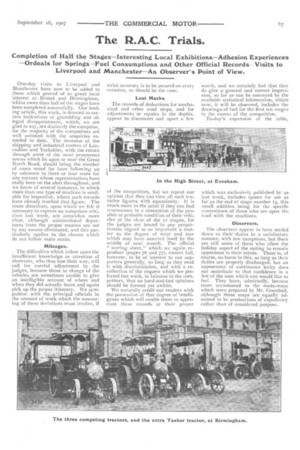
Page 12
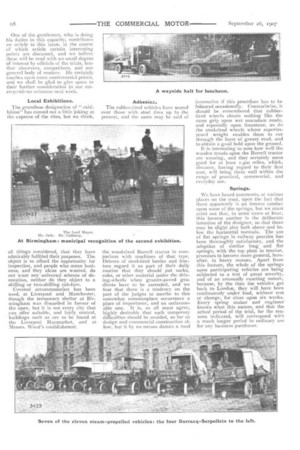
Page 13
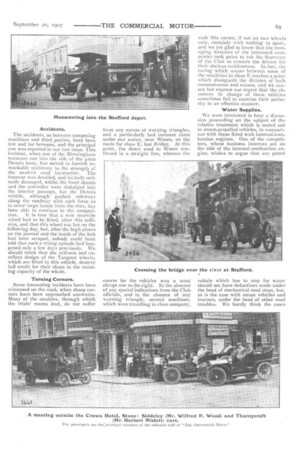
Page 15
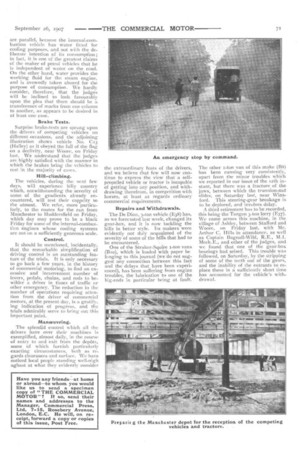
Page 16
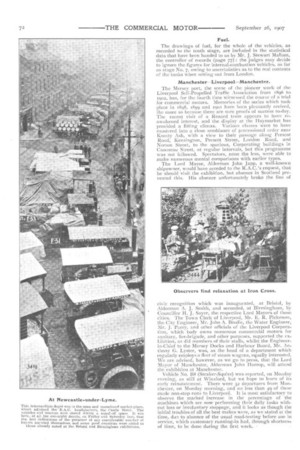
If you've noticed an error in this article please click here to report it so we can fix it.
Completion of Half the Stages—Interesting Local Exhibitions—Adhesion Experiences —Ordeals for Springs -Fuel Consumptions and Other Official Records Visits to Liverpool and Manchester—An Observer's Point of View.
One-day visits to Liverpool and Manchester have now to be added to those which proved of so great local interest at -Bristol and Birmingham, whilst more than half of the stages have been completed successfully. Our leading article, this week, is devoted to certain indications of grumbling and alleged disappointment, which, we are glad to say, are distinctly the exception, for the majority of the competitors are well satisfied with the enquiries recorded to date. The invasion of the shipping and industrial centres of Lancashire and Yorkshire, with the return through some of the most prosperous towns which lie upon or near the Great North Road, should bring the number of cases noted for later following up by salesmen to three or four score for any entrant whose representatives have really been on the alert throughout, arid we know of several instances, in which more than one type of machine is available for inspection, where such records have already reached that figure. The route directions, upon which we felt it necessary to express an outspoken criticism last week, are somewhat more clear, although unintentional departures from the proper courses are not by any means eliminated, and this particularly applies to the classes which do not follow main roads.
Mileages.
The difficulties which follow upon the insufficient knowledge or attention of observers, who thus lose their way, will call for careful adjustment by the judges, because those in charge of the vehicles are sometimes unable to give an intelligible account of where and when they did actually leave and again pick up the proper itinerary. We sympathise with the principal officials in the amount of work which the measuring of these deviations must involve, if
strict accuracy is to be secured on every occasion, as should be the case.
Lost Marks.
The records of deductions for mechanical and other road stops, and for adjustments or repairs in the depots, appear to disconcert and upset a few
of the competitors, but we repeat our opinion that they can view all such tentative figures with equanimity. It is much more to the point if they can find reassurance in a conception of the possible or probable condition of their vehicles at the close of the 22 stages, for the judges are bound to pay proportionate regard to so important a matter as the degree of wear and tear which may have asserted itself by the middle of next month. The official " scoring sheet," which we again reproduce (pages 76 and 77), cannot fail, however, to be of interest to our supporters generally, so long as they read it with discrimination, and with a recollection of the request which we preferred last week, in fairness to the competitors, that no hard-and-fast opinions should be formed yet awhile.
We naturally credit our readers with the possession of that degree of intelligence which will enable them to appreciate these records at their proper
worth, and we certainly feel that they d9 give a general and correct irnpression, so far as can be conveyed by the available statistital information, which now; it will be observed, includes the drawings of fuel for the first ten stages in the course of the competition.
To-day's expansion of the table, which was exclusively published by us last week, includes spaces for use as far as the end of stage number 15, this small addition being for the specific ccnvenience of those who are upon the road with the machines.
Observers.
The observers appear to have settled down to their duties in a • satisfactory manner, with few exceptions, but there are still some of them who allow the holiday aspect of the outing to remain uppermost in their minds. There is, of course, no harm in this, so long as their duties are properly discharged, but an appearance of continuous levity does not contribute to that confidence in a few of the men which one would like to feel. They have, admittedly, become more . accustomed to the route-maps which were prepared by Mr. Greathed, although these maps are equally admitted to be productions of expediency rather than of considered purpose.
One of the gentlemen, who is doing his duties in this capacity, contributes an article to this issue, in the course of which article certain interesting points are discussed, and we believe these will be read with no small degree of interest by officials of the trials, brother observers, competitors, and our general body of readers. He certainly touches upon some controversial points, and we shall be glad to give space to their further consideration in our correepondenee columns next week.
Local Exhibitions.
The grandiose designation of "exhibition" has caused not a little joking at the expense of the sites, but we think, all things considered, that they have admirably fulfilled their purposes. The object is to afford the opportunity for inspection, and people who mean business, and they alone are wanted, do not want any universal scheme of decoration, neither do they object to a shilling or two-shilling cab-fare.
Covered accommodation has been used, at Liverpool and Manchester, though the temporary shelter at Birmingham was discarded in favour of the open, but it is not every city that can offer suitable, and fairly central, buildings such as are to be found at the Liverpool Haymarket, and at Messrs. Wood's establishment.
Adhesioc..
The rubber-tired vehicles have scored over those with steel tires up to the present, and the same may be said of the wood-tired Bun-ell tractor in comparison with machines of that type. Drivers of steel-tired lorries and tractors regard it as part of their daily routine that they should put sacks, coke, or other material under the driving-wheels when granite-paved gradients have to be ascended, and we fear that there is a tendency on the part of the judges to ascribe to this somewhat commonplace occurrence a place of importance, and an unfavourable one. It is, as all must agree, highly desirable that such temporary difficulties should be avoided, so far as design and commercial construction allow, but it by no means damns a road locomotive if this procedure has to be followed occasionally. Contrariwise, it should be remembered that rubbertired wheels obtain nothing like the same grip upon wet macadam roads, and especially upon limestone, as do the steel-tired wheels whose superimposed weight enables them to cut through the layer of greasy mud, and to obtain a good hold upon the ground.
It is interesting to note how well the wooden treads upon the Burrell tractor arc wearing, and they certainly seem good for at least 1,5oo miles, which, distance, having regard to their first cost, will bring them well within the range of practical, commercial, and everyday use, Springs.
We have heard comments, at various places on the road, upon the fact that there apparently is an inverse camber upon some of the springs, but we must point out that, in some cases at least, this inverse camber is the deliberate intention of the designer, so that there may be slight play both above and below the horizontal normals. The use of flat springs in railway practice has been thoroughly satisfactory, and the adoption of similar long and flat springs, with the top plate in tension, promises to become more general, hereafter, in heavy motors. Apart .frorn this feature, the whole of the springs upon participating vehicles are being subjected to a test of great severity. and of an unusually exacting nature, because, by the time the vehicles get back to London, they will have been continuously under load, without rest or change, for -close upon six Weeks. Every spring maker and engineer knows what this means, and that the actual period of the trial, for the reasons indicated, will correspond with a much longer period in ordinary use for any business purchaser.
Accidents.
The accidents, as between competing machines and third parties, have been few and far between, and the principal one was reported in our last issue. This incident, when one of the Birmingham tramcars ran into the side of the 5-ton Dennis lorry, has served to furnish remarkable testimony to the strength of the modern road locomotive. The tramcar was derailed, and its body seriously damaged, whilst the front sheath and the controller were dislodged into the interior passage, but the Dennis vehicle, although pushed sideways along the roadway with such force as to sever large lumps from the tires, has been able to continue in the competi tion. It is true that a new nearside wheel had to be fitted, after this collision, and that this wheel ran hot on the followin.g day, but, after the high places on the journal and the inside of the hub had been scraped, nobody could have told that such a trying episode had hap.pened only a few days previously. We should think that the stiffness and excellent design of the Tangent wheels, which are fitted to this vehicle, deserve full credit for their share in the resisting capacity of the whole.
Turning Corners.
Some interesting incidents have been witnessed on the road, when sharp corners have been approached unawares. Many of the counties, through which the trials' routes lead, do not suffer from any excess of warning triangles, and a particularly bad instance came under our notice, near Woore, on the route for class E, last Friday. At this point, the direct road to Woore continued in a straight line, whereas the course for the vehicles was a most abrupt one to the right. In the absence of any special indications from the Club officials, and in the absence of any warning triangle, several machines, which were travelling in close company,
took this corner, if not on two wheels only, certainly with nothing to spare, and we are glad to know that the managing directors of the interested companies took pains to ask the Secretary of the Club to censure the drivers for their obvious recklessness. In fact, the racing which occurs between some of the machines in class E reaches a point which disregards the dictates of both commonsense and reason, and we cannot but express our regret that the observers in charge of these vehicles sometimes fail to exercise their authority in an effective manner.
Water Supplies.
We were interested to hear a discussion proceeding on the subject of the relative treatment which is meted out to steam-propelled vehicles, in compariSon with those fitted with internal-combustion engines. One of the competitors, whose business interests are on the side of the internal-combustion engine, wishes to argue that any petrol vehicle which has to stop for water should not have deductions made under the head of mechanical road stops, but, as is the case with steam vehicles and tractors, under the head of other road troubles. We hardly think the cases are parallel, because the internal-combustion vehicle has Water fitted for cooling purposes, and not with the deliberate intention of its consumption ; in fact, it is one of the greatest claims of the maker of petrol vehicles that he is independent of water_ on the road. On the other hand, water provides the working fluid for the steam engine, and is avowedly taken aboard for the purpose of consumption, We hardly consider, therefore, that the judges will be inclined to look favourably upon the plea that there should be a transference of marks from one column to another, as appears to be desired in at least one case.
Brake Tests.
Surprise brake-tests are sprung upon the drivers of competing vehicles on different occasions, and the adjoining illustration shows vehicle No. Ci3 (Halley) as it obeyed the fall of the flag on a declivity, near Woore, on Friday last. We understand that the judges are highly satisfied with the manner in which the brakes bring Lhe vehicles to rest in the majority of cases.
Hill-climbing.
The vehicles, during the next few days, will experience hilly country which, notwithstanding the severity of some of the gradients already encountered, will test their capacity to the utmost. We refer, more particularly, to the routes for the run from Manchester to Huddersfield on Friday, which day may prove to be a black Friday for some of the internal-combustion engines whose cooling systems are not on a sufficiently generous scale.
Control.
It should be mentioned, incidentally, that the remarkable simplification of driving control is an outstanding feature of the trials. It is only necessary to go back a few years, in the history of commercial motoring, to find an excessive and inconvenient number of levers, pedals, chains, and rods to bewilder a driver in times of traffic or other emergency. The reduction in the number of operations requiring attention from the driver of commercial motors, at the present day, is a gratify. ing indication of progress, and the trials admirably serve to bring out this mportant point.
Manmuvring.
The splendid control which all the drivers have over their machines is exemplified, almost daily, in the course of entry to and exit from the depots, some of which furnish particularly exacting circumstances, both as regards clearances and surface. We have noticedjocal people standing well-nigh aghast at what they evidently consider
the extraordinary feats of the drivers, and we believe that few will now continue to express the view that a selfpropelled vehicle or tractor is incapable of getting into any position, and withdrawing therefrom, in competition with horses, at least as regards ordinary commercial requirements.
Repairs and Withdrawals.
The De Dion, 3-ton vehicle (E38) has, as we forecasted last week, changed its gear-box, and it is now tackling the hills in better style. Its makers were evidently not duly acquainted of the severity of some of the bills that had to be encountered.
One of the Straker-Squire I-ton vans (Bop), which is loaded with paper be longing to this journal (we do not suggest any connection between this fact and the delays that have been experienced), has been suffering front engine troubles, the lubrication to one of the big-.ends in particular being at fault. The other t-ton van of this make (138) has been running very consistently, apart from the minor troubles which we reported in our issue of the 12th instant, but there was a fracture of the jaws, between which the trunnion-nut slides, on Saturday last, near Winsford. This steering-gear breakage is to be deplored-, and involves delay.
A third retirement has to be recorded, this being the Turg,an 3-ton lorry (E37). We came across this machine, in the village of Ashley, between Stafford and Woore, on Friday last, with Mr.
Arthur C. in attendance, as well as Captain Bagnall-Wild, Mech.E., and other of the judges, and we found that one of the gear-box bearings had seized. This trouble was followed, on Saturday, by the stripping of some of the teeth out of the gears, and the inability of the entrants to replace these in a sufficiently short time has accounted for the vehicle's withdrawal. Fuel.
The drawings of fuel, for the whole of the vehicles, as recorded to the tenth stage, are included in the statistical data that have been handed to us by Mr. J. Stewart Mallam, the controller of records (page 77) : the judges may decide to ignore the figures for internal-combustion vehicles, as far as stage No. 7, owing to uncertainties as to the real contents of the tanks when setting out from London.
Manchester—Liverpool—Manchester.
The Mersey port, the scene of the pioneer work of the Liverpool Self-Propelled Traffic Association from 1896 to 1902, has, for the fourth time witnessed the course of a trial for commercial motors. Memories of the series which took place in 1898, 1899 and 1901 have been pleasantly revived, the more so because there are sure proofs of success to-day. The recent visit of a Renard train appears to have reawakened interest, and the display at the Haymarket has provided a fitting climax. Various classes were to have mustered into a close semblance of processional order near Knotty Ash, with a view to their passage along Prescot Road, Kensington, Prescot Street, London Road, and Norton Street, to the spacious, Corocrating buildings in Cazeneau Street, at regular intervals, but this programme was not followed. Spectators, none the less, were able to make numerous mental comparisons with earlier types. The Lord Mayor, Alderman John Japp, a well-known shipowner, would have acceded to the R.A.C.'s request, that he should visit the exhibition, but absence in Scotland prevented this. His absence unfortunately broke the line of
civic recognition which was inaugurated, at Bristol, by Alderman A. J. Smith, and seconded, at Birmingham, by Councillor H. J. Sayer, the respective Lord Mayors of those cities. The Town Clerk of Liverpool, Mr. E. R. Pickmere, the City Engineer, Mr. John A. Brodie, the Water Engineer, Mr. J. Parry, and other officials of the Liverpool Corporation, which body owns numerous commercial motors for sanitary, fire-brigade, and other purposes, supported the exhibition, as did members Of their staffs, whilst the Engineerin-Chief to the Mersey Docks and Harbour Board, Mr. Anthony G. Lyster, was, as the head of a department which regularly employs a fleet of steam wagons, equally interested. We are advised, however, as we go to press, that the Lord Mayor of Manchester, Alderman John Harrop, will attend Life exhibition at Manchester.
Vehicle No. B8 (Straker-Squire) was reported, on Monday evening, as still at Winsford, but we hope to learn of its early reinstatement. There were 52 departures from Manchester, on Monday morning, and no less than 49 of these made non-stop runs to Liverpool. It is most satisfactory to observe the marked increase in the percentage of the machines which are now performing their daily tasks without loss or involuntary stoppage, and it looks as though the initial troubles of all the best makes were, as we stated at the time, du -± to absence of the usual road-testing before use in service, which customary running-in had, through shortness of time, to be done during the first week.




























